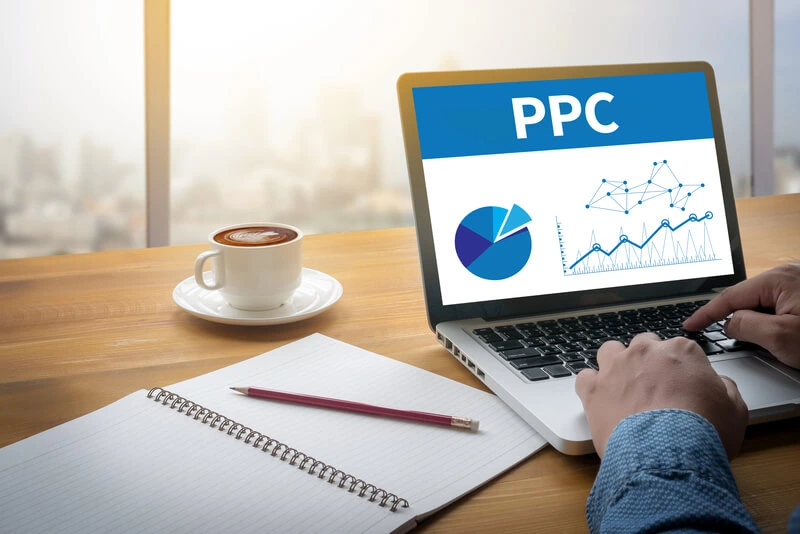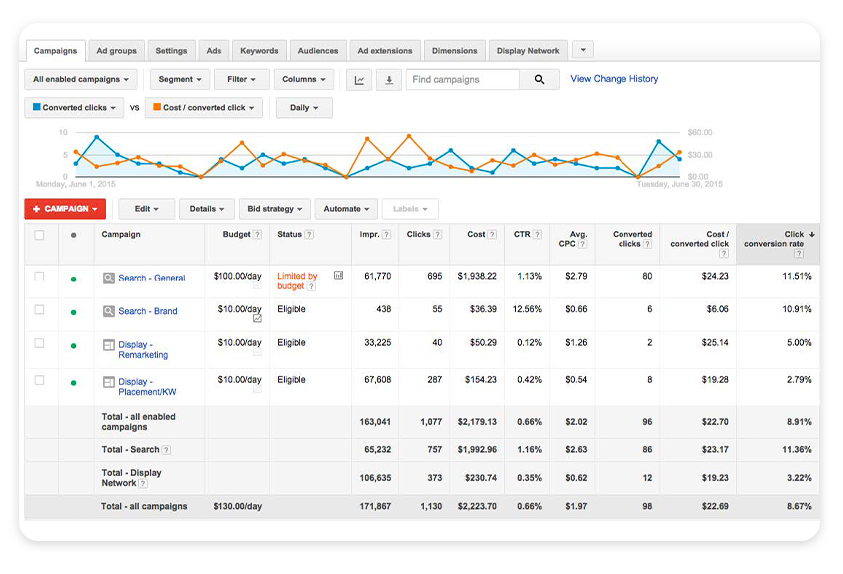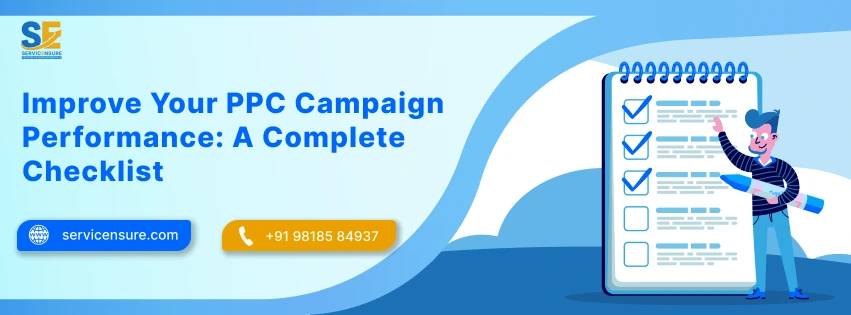While PPC campaign performance is known to provide stellar results, there are also other marketing methods, such as SEO and content marketing, which can also assist in improving ROI. So, why include PPC in the equation? This is a common question that many businesses ask. This is because the results of PPC can be instant, and the campaigns can be measured for the best results.
However, there are several factors to consider in order to get the desired results from the PPC campaign. To help you with the process, we will discuss the best practices you can implement to improve the performance of your PPC campaigns in this blog post.
Top 7 Ways In Which You Can Improve Your PPC Campaign Performance
Below, we have listed seven key ways that you can adhere to improve your PPC campaign performance and drive a higher ROI.
1. Evaluate Traffic Quality — Not Just Quantity
PPC campaigns are highly regarded for reaching an extremely wide base of audience. Although the audience is targeted with the relevant keyword, a large group does not necessarily mean more sales.
In order to get better results from your PPC campaigns, you will need to find and reach an audience that is likely to engage with your business.
Therefore, you will need to be very specific with factors such as interests, locations, behavior, and search intent. As a result of this, you will be able to make sure that your PPC campaigns are driving quality traffic and not just quantity.
2. Use Negative Keywords
In PPC ads, whenever a user clicks on your ads, you will be charged. In order to control the cost and ensure that your ads are only displayed to users who are likely to make a purchase, you will need to include negative keywords. Negative keywords are phrases that will exclude your PPC ads from being displayed on irrelevant searches. This will help you to further refine your audience targeting while blocking unqualified traffic. As a result of this, you will be able to further improve the performance of your PPC campaigns.
3. Measure Your Performance
There is a wide array of powerful tools that allow you to easily track your PPC campaign performance. With this data at your disposal, you will be able to prioritize the profitable aspects of your campaigns while halting the ones that are not providing any results. The best part? The data of your campaigns is updated in real-time. This means that you do not need to wait impatiently, worrying whether the campaign was able to improve the ROI or not.

4. Remarketing Options
PPC provides great remarketing value, as it allows you to re-engage with users who have previously clicked on your ads. According to stats, about 26% of people are likely to go back to the website and make a purchase because of remarketing PPC services.
Mentioned below are the key benefits you can expect with remarketing.
- Personalized Experience: In remarketing, you can alter the ads according to a group of audiences and create a personalized experience.
- Enhances Brand Recall: Remarketing can help you to reinforce the awareness as well as recall of your brand to users who have previously clicked on your ads.
- Flexibility: In PPC campaign management, you get the flexibility to control the duration as well as the flexibility of your campaigns. This means that your PPC campaign strategy is likely to always remain relevant, not intrusive to your audience.
Check out our article on Why Is Digital Marketing Agency for Startups Essential to grow your business in an organic manner.
5. Leverage Heatmaps
Heatmaps refer to areas where users click, scroll, and spend the most attention. By using heatmaps, you can gain crucial insights into what your customers are actually doing when they visit your website. Analyses of these data can help you identify the behavioral patterns of your users and spot trends in their interactions. Moreover, this data can be used to further optimize your landing pages to improve the conversion rates.
6. Make Use of AI Tools
In the wide field of digital marketing, AI tools are used for multiple purposes, and can also be utilized to get better performance of PPC campaigns. AI tools, such as Google Ads Smart Bidding, can be used to automatically set bids in ads auctions based on the goal of increasing conversions. This is only a single example of using AI tools for PPC. These tools can also assist with other aspects, such as keyword research and audience targeting. By effectively using such tools, you will not only be able to save time by streamlining the processes, but you will also eliminate the chances of human errors.
7. Continuous Performance Optimization
In order to boost the performance of your PPC campaigns, you will need to proactively monitor how your ad campaigns are performing. With this analytics, you can optimize the campaigns by adjusting the budget, refining the target audience, and improving the quality of the landing page. Moreover, the best PPC company in Gurgaon also runs A/B ad campaigns to check which strategy is performing better.
By continuously monitoring the performance of your campaigns, you will be able to drastically reduce the waste spent, all the while improving the ROI. As a result, you will be able to ensure that your PPC campaigns are bringing in the desired results.

Search Engine Optimization | Social Media Marketing | Content Marketing Services
Check These Metrics For Better PPC Campaign Management
Before we discuss the steps to check the PPC performance, you should understand that the performance of PPC campaigns cannot be judged by looking at a single number. Each metric, such as clicks, conversions, and cost, is essential to check how well the campaign has performed.
For better PPC campaign management, you will need to analyze the metrics we have listed below.
1. Click Through Rate (CTR)
CTR refers to Click Through Rate and is used to measure how often potential customers have clicked on your ad vs how often the ad was displayed on SERP or social media feed. To calculate this, the formula of (Number of clicks / Number of impressions) * 100 is used. CTR can help you understand how well your ad campaigns are resonating with the audience and encouraging them to take action.
2. Cost Per Click (CPC)
CPC is measured by dividing the total cost of campaigns by the number of clicks. To explain this with an example, if a campaign costs $1000 and receives 100 clicks, then the CPC would be $10 per click. By using this formula, you will be able to figure out the cost of per click on your PPC campaign. A higher CPC can either mean that you are running your ads in a highly competitive market or that they are under-optimized.
3. Conversion Rate
Conversion rate is used to measure the percentage of clicks that have resulted in a defined action. These actions can be form fills, sign-ups, or even purchases. The formula of number of conversions / number of clicks multiplied by hundred is used to calculate the percentage of users who have clicked on an ad and taken a desired action on the landing page.
4. Return on Ad Spend (ROAS)
ROAS is used to measure the revenue generated for the cost spent on advertising. This can be measured via the formula of revenue generated from ads / the total ad cost. By using this metric, you will be able to determine the effectiveness of your PPC campaign.
By checking the metrics we have listed above, you will be able to judge the performance of your PPC campaigns. With these analytics by your side, you will be able to make data-driven decisions on what to optimize factors.
Ready to grow your business?👉 Get directions to our office.
Boost The Performance of Your PPC Campaigns
PPC offers a wide suite of benefits, and in order to experience them, you can implement the practices we have listed above. While the results of your PPC campaign performance can be instant, there are several factors at play that you will need to consider to achieve your desired goals.
We advise that you start small with your PPC campaigns and focus on factors that contribute to your final goals. Also, timely analyze the performance of your campaigns, but don’t try to analyze all metrics at once. And if you need professional help, don’t hesitate to reach out to ServicEnsure Digital Marketing Agency.
FAQs
Is PPC same as SEO?
While both practices aim to improve traffic and drive conversion, there are several key distinctions between them. The most notable difference is that PPC is a paid method and provides instant results. SEO, however, focuses on improving the ranking in an organic manner.
Is PPC limited to Google?
No, PPC is not limited to Google. It is a fairly common advertising model that can be used across multiple platforms, such as Bing and LinkedIn.
What is the best PPC campaign strategy?
Although there is the definition for the “best” PPC campaign strategy can differ from business to business, you can craft a reliable strategy by clearly defining your goals and performing in-depth keywords research. Also, you will need to craft compelling ad copies, optimize landing pages, and set up strategic targeting and bidding.
How much do PPC services cost?
The cost of PPC services can differ significantly. This is because there are multiple factors, such as keyword bids and the end date for ad, can drastically influence the cost.
Is PPC the best method in digital marketing?
Although PPC is not essentially the “best” marketing method, it can provide instant results and contribute significantly to improving the ROI.
Can PPC help improve SEO rankings?
No, PPC campaigns cannot directly increase SEO rankings as search engines treat paid and organic results separately to maintain search integrity. However, PPC campaigns can indirectly benefit SEO by improving brand awareness and providing valuable ad data.

Ved is a skilled Digital Marketing Expert known for building data-driven strategies that boost brand visibility and lead generation. With hands-on experience in SEO, PPC, and content marketing, he helps businesses scale their online presence and achieve measurable growth. His analytical approach and constant learning mindset make him a go-to expert for modern marketing challenges.



